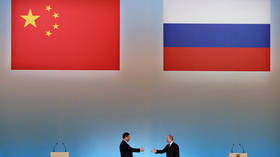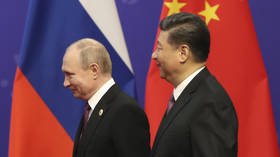Moscow explains how Russia-China relations are affected by Western sanctions

The West’s policy of imposing sanctions and threatening Moscow and Beijing with restrictive measures has not driven a wedge between the two, Russian Ambassador to China Andrey Denisov has said amid heightened tensions with Washington and its allies in Europe.
Speaking at a press conference on Tuesday, Denisov insisted that the recent increase in global hostilities primarily boils down to complications in Russia’s relationship with the US and EU. He added that Beijing’s ties with the West are also riddled with “many problems and difficulties.”
“All of this is entirely due to the position of those who oppose us,” he said. “Neither China, nor Russia are the cause of the latest international tensions – the responsibility for this lies on the other side.”
The ambassador noted that while Moscow and Beijing take into account the sanctions imposed by the “US and the European countries which follow Washington,” the measures do not have any influence on the two nations’ ties.
Denisov said that “Russia-China relations have an independent and very special value” for both countries. He added that cooperation between the two states in all areas is “a powerful factor in containing the spread of tension,” as well as “in stabilizing both the regional and international situation.”
The envoy’s remarks come as Moscow and Beijing have stressed the importance of their relations in an array of areas, including trade, energy, and defense, in the face of Western pressure. Speaking to journalists at his annual press conference in December, Russian President Vladimir Putin hailed the ties between the two countries.
Putin said the two states have “very trusting relations and it helps us build good business ties,” and revealed that the world’s largest nation and its most populous are cooperating in the field of security. In addition, he said that Beijing and Moscow are developing high-tech weaponry together.
Earlier in December, Yury Ushakov, the Russian leader’s foreign policy adviser, said Putin and Chinese President Xi Jinping promised to develop shared financial structures to enable the two nations to deepen their economic ties without the interference of third-party countries.
The announcement appeared to be in response to a series of threats that Western nations could look to shut out Russia from the Brussels-based SWIFT financial system as a form of sanctions should Moscow stage an invasion of Ukraine, which the Kremlin has repeatedly denied it has any plans for.
Despite the warm rhetoric and increasing military and economic co-operation, a number of analysts have previously pointed out that meaningful ties between the two powers are limited in comparison to blocs like NATO.













